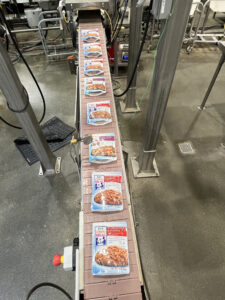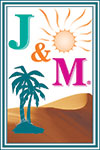
We’re here to help with any questions you have about J&M® brand halal shelf stable meals. Below are the answers to commonly asked questions about our meals, including information about ingredients, purchase, storage, shelf life, and religious preparation.
If you don’t find the answer to your question, please contact us and we will get to you back as soon as possible.
Email is the best way: sales@halalcertified.com No. The Halal supplier market is still in its infancy in the US. While in the US there is a supplier network for consumer hand–slaughtered poultry, the ingredient supplier network is not yet developed. J&M is working with the industry to develop this practice further. However, we work with Islamic slaughter men and certifiers which require the poultry slaughter line to be slowed and for the blessing to be recited over each bird by a trained Islamic slaughter man. Any birds missed are pulled off the line to be sold as non-halal. Yes. No. Like all consumers, some are and some are not. No. Halal certification is unique. Kosher is not Halal. Halal is not Kosher. The use of alcohol in flavors or colors is not a kosher issue, but it is an issue for halal. In addition, kosher slaughter does not meet the Islamic religious requirement of blessing each animal at the moment of slaughter. And kosher certification of many vegetarian-type items do not meet halal standards. For example, cheese, marshmallows, candies, baked goods and yogurt may have enzyme or gelatin ingredients from animals which are not halal. Similarly, meat and dairy ingredients can be mixed for halal but not for kosher. The complexities of processed foods, the international sourcing of ingredients and the religious requirements of dhabiha halal slaughter make halal certification unique. For more detailed information, we wrote an article about the differences between kosher and halal certification for the Institute of Food Technologists, Getting Religion – For Your Products That Is by Mary Anne Jackson July 2000, Volume 54, No.7 Ingredients used in processed foods may contain haram ingredients in colors, flavors or processing aids, as well as in sub-ingredients used. Processing plants may also produce non-halal products for other customers where one ingredient supplier may be acceptable for non-halal certified products, but not approved for halal certified products. Equipment may be shared with both non-halal and halal products requiring a special cleaning and inspection by a trained, independent Halal inspector. Haram means “prohibited” or “forbidden” for consumption, including pork, alcohol, carrion, or any slaughter not meeting the standards of proper slaughter. Today, the processing of foods for wide distribution means that even many formerly home-made meals, breads, yogurts or cereals may no longer be considered halal. This may occur because non-halal ingredients or shared production facilities with non-halal production are utilized. Dhabiha (Zhabiha) Halal refers to meat and poultry properly slaughtered by a trained slaughter man according to specific procedures and practices. It also refers to processed meats, meat products, and meat by-products. The word Halal means “proper and permitted.” Halal designated food items meet religious dietary laws and are permitted to be consumed. Halal includes all fruits, vegetables and grains. This designation was simple to follow at a time when food was prepared at home or within a community, long before the processed foods industry of today. Every case of J&M® halal certified MRE rations and meal kits has two codes printed on the side of the Master Case. An inventory is maintained to sustain a state of readiness for emergencies and unexpected surges in demand, so be sure to inquire as to the current “Best By” date of the inventory at the time of your order, especially if shelf life is important to your purchase decision. We ship FIFO basis. Our rations and meal kits are not intended for long-term storage. On the back of every pouch you will see “BEST BY:” followed by a date written as MM/YYYY, meaning the two digit month followed by the four digit year. The Best By date indicates a date by which the meal is the most flavorful. Meals can be consumed after that date, but the taste may not be as flavorful or the color as vibrant. We ship to customers on a First-In-First-Out (FIFO) basis. Yes. The Best By date is printed on the back of the printed pouch. This is the recommended date to serve the meal for maximum texture, flavor and freshness. No. TSA requirements today limit the amount of liquid you can carry on-board. TSA uses the total weight of the package as the determining weight, no matter how much liquid is in the container. Pack them carefully in your checked bags to avoid puncturing the lid or pouch. J&M® new stand-up plastic food pouches carry a two and half (2.5) year shelf life from the date of manufacture, if they are consistently stored between 50F (10C) and 80F (26C). Our meals are designed for ambient storage conditions, not too hot and not too cold! Either freezing or storing them at high temperatures could actually damage the quality of the meals. To assure shelf life integrity, store unopened pouch or tray J&M® meals in the pantry, in your office, or in your locker. Once the meal is heated, it should be consumed and not be returned to the shelf for storage. If the meal is opened, it should be put into a storage container and promptly refrigerated as all prepared food items are handled. Meals are not shelf stable once opened. No. Our meals should actually be protected from freezing, as they are designed for ambient storage conditions. Refrigeration is NOT required and they should never be stored in the freezer. Freezing may damage the quality of the meals. Long-term storage consistently between 50F (10C) and 80F (26C) assures optimal shelf life integrity. Yes. Although all meals taste better when heated before eating, they are perfectly safe and delicious to eat cold, especially in emergency situations where heating is not an option. We ship Monday through Thursdays. J&M® brand meals usually ship on the next shipping day via UPS. Depending upon where we are shipping, UPS takes between 2 to 6 business days after we ship your order. Full pallet orders are shipped LTL and delivery is usually between 2 to 14 business days. We added a handling charge to cover the cost of processing smaller orders. We added a charge to cover some of the cost of processing credit cards. We accept US-based Visa and Master Card. We do not process credit cards on this site. However, you can download the ORDER FORM, fill it out and fax it to us at 847-948-0468, or email a scan of the page it to sales@halalcertified.com. Please remember to include a contact number so that we can obtain your credit card information to process the order. Or call the information in to our office at (847) 948-1290. Just inquire via email at sales@halalcertified.com We work with many customers who are concerned about specific food allergies and diets. See Special Diets for additional information. No, and there are no artificial flavors, colors or MSG, just delicious and wholesome ingredients. Yes. Vegetarian Stew & Hearty Lentil Stew. Yes. Vegetarian meals are available in tasty varieties, Kosher & Halal certified: Florentine Lasagna (Dairy) Hearty Lentil Stew (Pareve) Pasta with Garden Vegetables (Pareve) All our halal meals are: If I have questions about the meals, how should I contact you?
Does a trained Islamic slaughter man hand-slaughter all poultry used in J&M® halal meals?
Does a trained Islamic slaughter man hand-slaughter all meat used in J&M® halal meals?
Are all Muslims Vegetarians?
Aren’t Kosher certified products also Halal? Is Halal also Kosher?
How have processed foods complicated the definition of halal?
What does Haram Mean?
What does Dhabiha (Zhabiha) Halal Mean?
What does Halal Mean?
How do I read a lot code on the Meals Ready to Eat (MRE), Rations and Meal Kits – Best By Date?
How do I read a Best By Date on the Stand-Up Plastic Pouch meals?
Do your meals show BEST BY dates?
Can I pack J&M® pouch meals in my carry-on luggage?
What is the shelf-life of J&M® Stand-Up Plastic Pouches?
How should J&M® meals be stored?
Should I freeze the meals when I receive them?
Can J&M® Brand meals be eaten unheated?
How long does it take to get the meals after I order them?
Why is there a handling charge on smaller orders, but not on orders of 44 or more cases?
What is the credit card processing fee charge?
What credit cards do you accept?
How do I purchase J&M® Meals?
Where can I find nutritional labeling information?
What if I have food allergies or food sensitivities?
Do you use preservatives in your meals?
Are any of your meals vegan?
Are any of your meals vegetarian?
Un-Stuffed Peppers (Dairy)
Mushroom Stroganoff (Dairy)
Vegetarian Stew (Pareve)
Tuscan Pasta & Beans (Pareve)Who orders J&M® halal meals?
Why should I buy the J&M® Brand?
